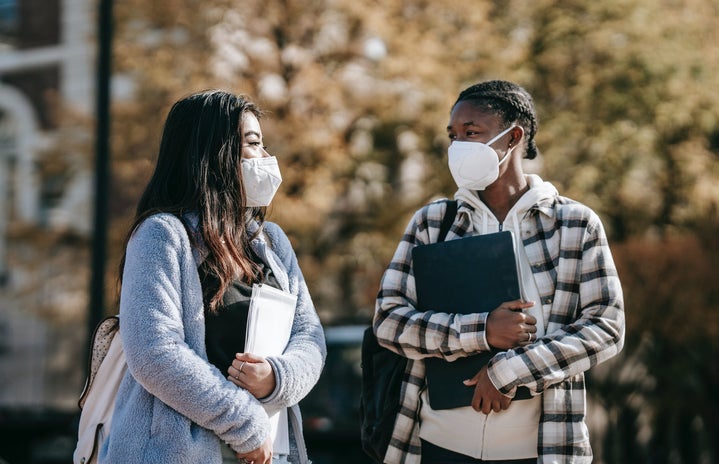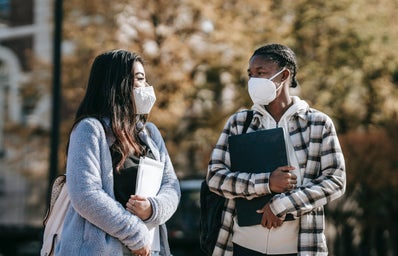The UW (University of Washington) announced in an email on January 3rd, 2021, that the university plans to “resume largely in-person on January 10th, 2021.” But, just four days, later the Office of the President announced that professors will be extended flexibility until January 28th, 2021, for how they choose to hold their classes. Professors will now have the option to go forward with in-person instruction, so long as they have options for remote students to participate or they can hold their classes fully remote until the 28th. These updates came after the CDC’s announcement on December 27th, announcing shortened guidelines for returning to work after having COVID-19.
The CDC’s shortened guidelines made it clear to me that the CDC, an organization that prides itself in “saving lives and saving people”, cares more about the economic consequences an airborne disease has on the country than the health and well-being of people. The CDC’s decision, although stated based on science and the fact that COVID and the Omicron variant are less susceptible for transmission after 5 days, seems to largely be influenced by the effects a surge of COVID cases on the labor market. Delta Airlines CEO, Ed Bastian, sent a letter to the CDC asking them to reduce isolation times because of the strain longer isolation periods were having on their workforce.
Unfortunately, it seems that the UW, like the CDC, is making its decisions based off monetary and productivity concerns. Cases in the U.S. surpassed 1 million, breaking records on January 3rd. Cases in Washington have been on the rise, as The News Tribune on January 5th reported that “For the past seven days, Washington has had a strong upward trending case rate of 669 per 100,000 people.” In the same article, The News Tribune reported King County having 222,392 cases that day. When the University shutdown in March 2020 at the beginning of the pandemic and Washington state entered a period of lockdown, the number of cases in the state were between 2,200-3,700.
While the President’s announcement on January 5th states professors are being given the flexibility to decide if they hold in person or remote classes, students are left to pay the consequences of their professor’s decisions. While the announcement stated that professors who do choose to hold in person classes must also have an option for students to partake remotely, many professors place a greater emphasis on the learning of students who attend in-person classes. One of my professors this quarter, for example, has stated that they will record Zoom lectures and use Panopto to record lectures once we resume in person instruction. But, this week, he forgot to record lecture on both days of class and said that although no recording was available, students were still responsible for materials discussed in class, including classroom policies. I had this professor last quarter, who stated he would record classes for students who felt safer participating remotely, but he would often forget or was unable to record lectures due to technological difficulties, but was still adamant about students still being responsible for those lecture materials. While the option for students to participate remotely is technically being offered by him, students who chose not to attend in person classes due to concerns about their health, or those who simply can’t attend because they are infected, are being screwed in the process. Students should not bear the consequences of choosing to learn remotely for the wellbeing of themselves and others.
Not only are we experiencing a surge of COVID cases, but the nation and Washington state are experiencing a shortage of COVID-19 testing appointments and at-home tests and N95 masks (the kind of masks being recommended to use as they provide the best protection) are being doubled or tripled in prices. All these things combined can lead to further surges in cases. Not to mention, US borders have remained open, and vaccines are still not available in every country. The surge in COVID-19 cases have led to overwhelmed hospitals, leaving healthcare workers to bear the burden of being constantly exposed to COVID and not enough beds for patients.
Returning to campus and resuming in-person instruction is something I look forward to, but only if it is safe to do so, and I don’t believe that is the case. The UW student body is made up of 41% of international and out-of-state students. Considering we just came back from winter break and many students went home, this only heightens the risk of spreading an airborne virus. Not to mention that many students could’ve gone to super spreader events such as holiday parties.
I believe the UW’s decision to avoid returning to remote learning is showing us that despite their announcements to continue delaying in-person instruction, they are not prioritizing the health of their students. By leaving the decision of how classes are taught to professors, the UW is leaving students at the mercy of their professors. COVID-19’s long-term effects are still unknown and being that we live in a country with privatized healthcare, I can’t imagine what long-term consequences COVID-19’s long-term effects will have on citizens’ ability to secure access to healthcare when insurance companies aren’t fond of patients having “preexisting conditions.”
The idea that COVID-19 is a virus we will all get at one point and that we must let it “take its course” leaves immunocompromised people and disabled folks vulnerable to the effects of the virus. While we have gotten to the point of the pandemic that it’s more unlikely for an individual to die from COVID-19 because of vaccines being available, the same cannot be said about its long-term consequences. It also ignores the fact that immunocompromised and disabled individuals are still at high risk if they get COVID.
I wasn’t a fan of Zoom university, and I can’t say I want to go back to staying in my apartment all day every day, but I also believe we all have the right to an education while remaining safe from contracting an airborne virus. The UW is one of nation’s (and state) leader in public health and medicine, and it has a responsibility to guide other institutions to proceed safely for the sake of student and the public. We must prioritize the health and wellbeing of all students, including immunocompromised and disabled students who have just as much a right to an education while remaining safe as any other able-bodied individual.


